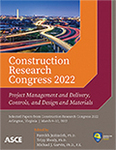A Pre-Demolition Planning Framework to Balance Recyclability and Productivity
Publication: Construction Research Congress 2022
ABSTRACT
Pre-demolition planning involves a tradeoff between recyclability and productivity due to the factors affecting different stakeholders. Demolition contractors hope to maximize their profits by selling salvaged materials to recycling markets and avoid the disposal fees by diverting the waste from landfill sites. This may result in an extended duration of the demolition phase of the project due to the use of labor-intensive demolition methods that yield more salvageable materials. Owners and general contractors, on the other hand, try to avoid such extensions in their demolition plans as they can result in project delays and additional costs to the construction project that follows the demolition phase. Although these two opposing ideas (i.e., recyclability and productivity) serve as driving factors for pre-demolition planning, researchers and practitioners have rarely considered the tradeoffs in pre-demolition planning. This paper develops a framework to find the optimal balance between recyclability and productivity in pre-demolition planning, which determines combinations of different demolition methods (i.e., saw cutting and standard, mini, and high-reach excavators) to demolish different sections (or buildings) in a project. Linear programming is employed to find the demolition plan that maximizes the profit from salvaged materials within time constraints. Specifically, the developed model considers different costs associated with the demolition project, including clean fill disposal, landfilling, and direct demolition costs, along with the project’s scheduled time constraints. For demonstration, we implement the proposed framework to guide the development of a demolition plan for a project in the Midwestern United States.
Get full access to this article
View all available purchase options and get full access to this chapter.
REFERENCES
Abdullah, A., Anumba, C. J., Kingdom, U., and Durmisevic, E. (2003). “Decision tools for demolition techniques selection.” Deconstruction and Materials Reuse. Proceedings of the 11th Rinker International Conference, CIB Publication 287, Cambridge, UK, 55–72.
Aboelmagd, Y. M. R. (2018). “Linear programming applications in construction sites.” Alexandria Engineering Journal, Faculty of Engineering, Alexandria University, 57(4), 4177–4187.
Brandão, R., Edwards, D. J., Hosseini, M. R., Cristiano, A., Melo, S., and Macêdo, A. N. (2021). “Reverse supply chain conceptual model for construction and demolition waste.” Waste Management & Research, 0734242X21998730.
Ding, Z., Gong, W., Li, S., and Wu, Z. (2018). “System dynamics versus agent-based modeling: A review of complexity simulation in construction waste management.” Sustainability (Switzerland), 10(7).
Ginga, C. P., Ongpeng, J. M. C., and Daly, M. K. M. (2020). “Circular economy on construction and demolition waste : A literature review on material recovery and production.” Materials, 13(13), 2970.
Islam, R., Nazifa, T. H., Yuniarto, A., Shanawaz Uddin, A. S. M., Salmiati, S., and Shahid, S. (2019). “An empirical study of construction and demolition waste generation and implication of recycling.” Waste Management, Elsevier Ltd, 95, 10–21.
Jeffrey, C. (2011). “Construction and demolition waste recycling: A literature review.” Dalhousie University’s Office of Sustainability, 35.
Kourmpanis, B., Papadopoulos, A., Moustakas, K., Stylianou, M., Haralambous, K. J., and Loizidou, M. (2008). “Preliminary study for the management of construction and demolition waste.” Waste Management & Research, 26(3), 267–275.
Manuel, J., Correia, F., Cardoso, G., Neto, D. O., Leite, R. R., and Silva, D. (2021). “Plan to overcome barriers to reverse logistics in construction and demolition waste: Survey of the construction industry.” J. Constr. Eng. Manage., 147(2), 04020172.
Menegaki, M., and Damigos, D. (2018). “A review on current situation and challenges of construction and demolition waste management.” Current Opinion in Green and Sustainable Chemistry, Elsevier B.V., 13, 8–15.
RSMeans. (2007). Building Construction Cost Data. Reed Construction Data Inc., Kingston, MA.
Ruiz, L. A. L., Ramon, X. R., and Domingo, S. G. (2020). “The circular economy in the construction and demolition waste sector–A review and an integrative model approach.” Journal of Cleaner Production, 248, 119238.
Srour, I. M., Haas, C. T., and Morton, D. P. (2006). “Linear programming approach to optimize strategic investment in the construction workforce.” J. Constr. Eng. Manage., 132(11), 1158–1166.
USEPA. (2020). Advancing Sustainable Materials Management: 2018 Fact Sheet.
Vargas, M., Alfaro, M., Karstegl, N., Fuertes, G., Gracia, D., Mar-Ortiz, J., Sabattin, J., Duran, C., and Leal, N. (2021). “Reverse Logistics for Solid Waste from the Construction Industry.” Advances in Civil Engineering.
Xu, J., Shi, Y., and Zhao, S. (2019). “Reverse logistics network-based multiperiod optimization for construction and demolition waste disposal.” J. Constr. Eng. Manage., 145(2), 04018124.
Information & Authors
Information
Published In
History
Published online: Mar 7, 2022
Authors
Metrics & Citations
Metrics
Citations
Download citation
If you have the appropriate software installed, you can download article citation data to the citation manager of your choice. Simply select your manager software from the list below and click Download.
